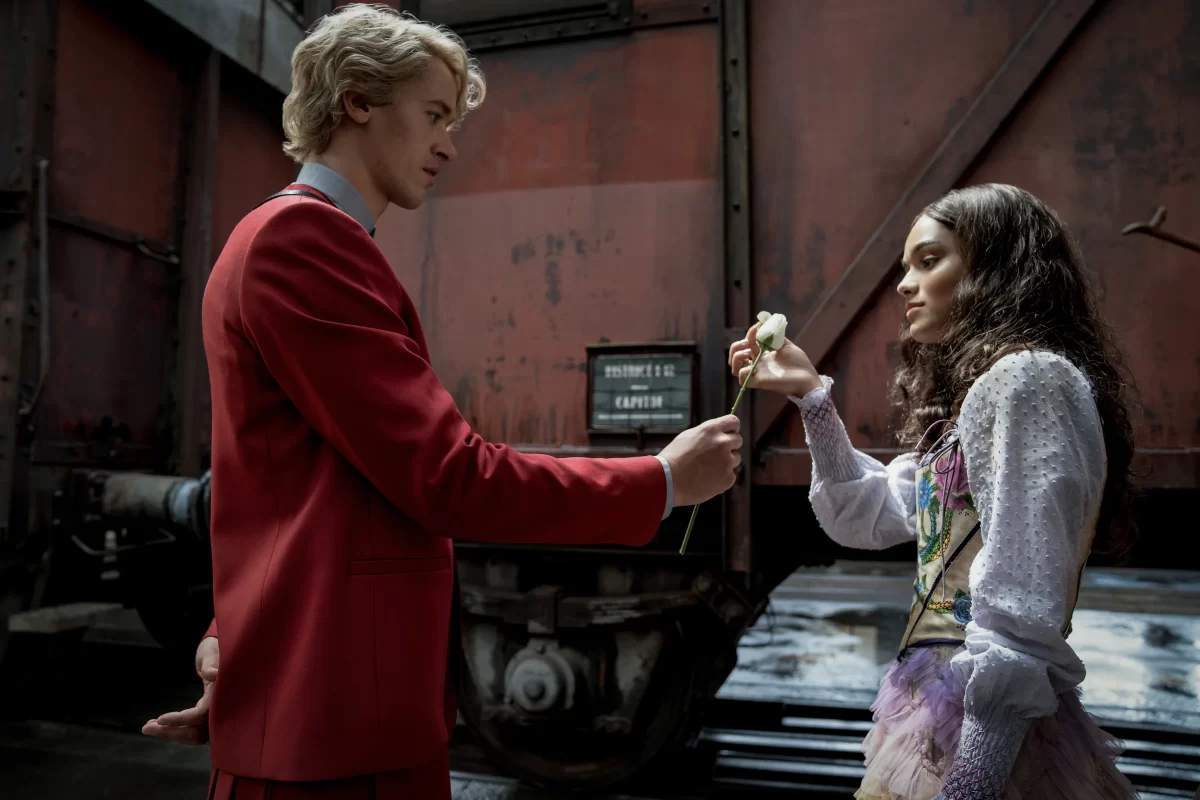On November 17, a frenzy filled the theaters as The Hunger Games: The Ballad of Songbirds & Snakes was released. Directed by Francis Lawrence, the film is based on Suzanne Collins’ prequel to her famous Hunger Games trilogy. The movie is faithful to most of the canon events from the novel, following the journey of the notorious President Snow as he mentors Lucy Gray Baird, District 12’s tribute to the 10th Hunger Games. Taking place more than 60 years before the events of the original trilogy, The Ballad of Songbirds & Snakes acts as the villain origin story audiences tend to love. Unfortunately, this movie is not one to love.
The film’s most notable weakness was its pacing. Out of the three hour long movie, only the final twenty minutes came close to genuine entertainment. By that point, the movie had dragged on for so long that the final act lost any remaining momentum from the previous two acts. Though despite its length, the movie manages to feel overstuffed. Given the book’s many details and various plot points, it was clearly difficult for the filmmakers to create a movie that is faithful to the source material while also smooth and easy to understand. The movie ultimately feels rushed and anticlimactic when compared to the book.
Another point to address was the myriad of mediocre acting. Although Tom Blyth’s performance as Coriolanus Snow was alluring to many viewers, the movie lacks some of the details that made Snow such a compelling character in the novel. In the book, Collins designed Snow to have an eerily obsessive trait, which was largely abandoned in Blyth’s performance. This aspect of Snow is crucial in illustrating his development to the relentless dictator he is in the main trilogy.
While Blyth’s performance alone did not fail the movie, some surrounding actors certainly did. In a particular scene, the quality of the acting plummeted when top students from Academy Rouge, the disciplinary and elite school for the Capitol’s most powerful, were selected to mentor the Hunger Games tributes. During this scene, the classmates casually converse, making it a perfect opportunity for the audience to understand each character. However, these actors were unable to develop an accurate dynamic with one another, making the scene almost painful to watch.
These small details in performance were part of what stole away from the story. Additionally, the style of the film was another one of these details. If executed correctly, the dystopian genre that The Ballad of Songbirds & Snakes falls into generally has potential for some of the most harrowing and impactful narratives. By almost romanticizing the dark nature of their stories, dystopian novels and films often captivate their audiences. The Ballad of Songbirds & Snakes certainly had opportunities to make its disturbing story meaningful. Yet it wasn’t. There was nothing “romantic” or impactful about the gory scenes. They were simply grotesque and annoyingly predictable.
Nevertheless, the film came close to fulfilling a dystopia’s objective a couple of times. During act two, District 11 tribute, Reaper Ash, covers the bodies of dead tributes with the Panem banner. As an act of rebellion and respect, this impactful scene manages to produce a couple tears from its audience. Likewise, Snow’s psychotic tantrum in the final act was tastefully done. The cinematic details of the scene where Snow shoots at the mockingjays echoing Lucy Gray’s song helped instigate an unsettling promise of violence. Seeing that his corruption had led him to turn on the love of his life certainly left the theater in an anticipatory silence.
Some of the other stronger aspects of the film came from Rachel Zegler’s enticing performance. Zegler, who plays Lucy Gray Baird, stole the show with her multiple vocal performances, all of which were recorded live on set. This should come as no surprise since Zegler has an extensive performing arts background, most recently winning a Golden Globe for her role in 2021’s West Side Story remake. Zegler brings Lucy Gray Baird’s charm and uncrushable spirit out in her confident and witty performance.
Other standout performances included Viola Davis and Jason Schwartzman. Davis, who plays Dr. Gaul, the ruthless Gamemaker, is incredibly captivating. Her character is deeply sinister, and her command of the role does not disappoint. Dr. Gaul’s campy appearance does not take away from the deeply terrifying reality of her cruelty and power, and this makes her an antagonist audiences can genuinely fear. Schwartzman, who plays Lucky Flickerman, the weatherman turned television host of the games, is a breath of fresh air in the sometimes overly dense movie. Flickerman is hilariously upbeat and unaware of some of the darker facets of the games, making him excellent comic relief.
Overall, The Ballad of Songbirds and Snakes lacks as a film what made the book compelling and is at times confusing. It is certainly not the engrossing dystopia that the previous Hunger Games films managed to capture.
The movie is not irredeemable though – Zegler’s performance breathes life into the screen and leaves us wanting more Lucy Gray, while Davis raises the hairs on the backs of our necks with Dr. Gaul’s chilling cruelty.

